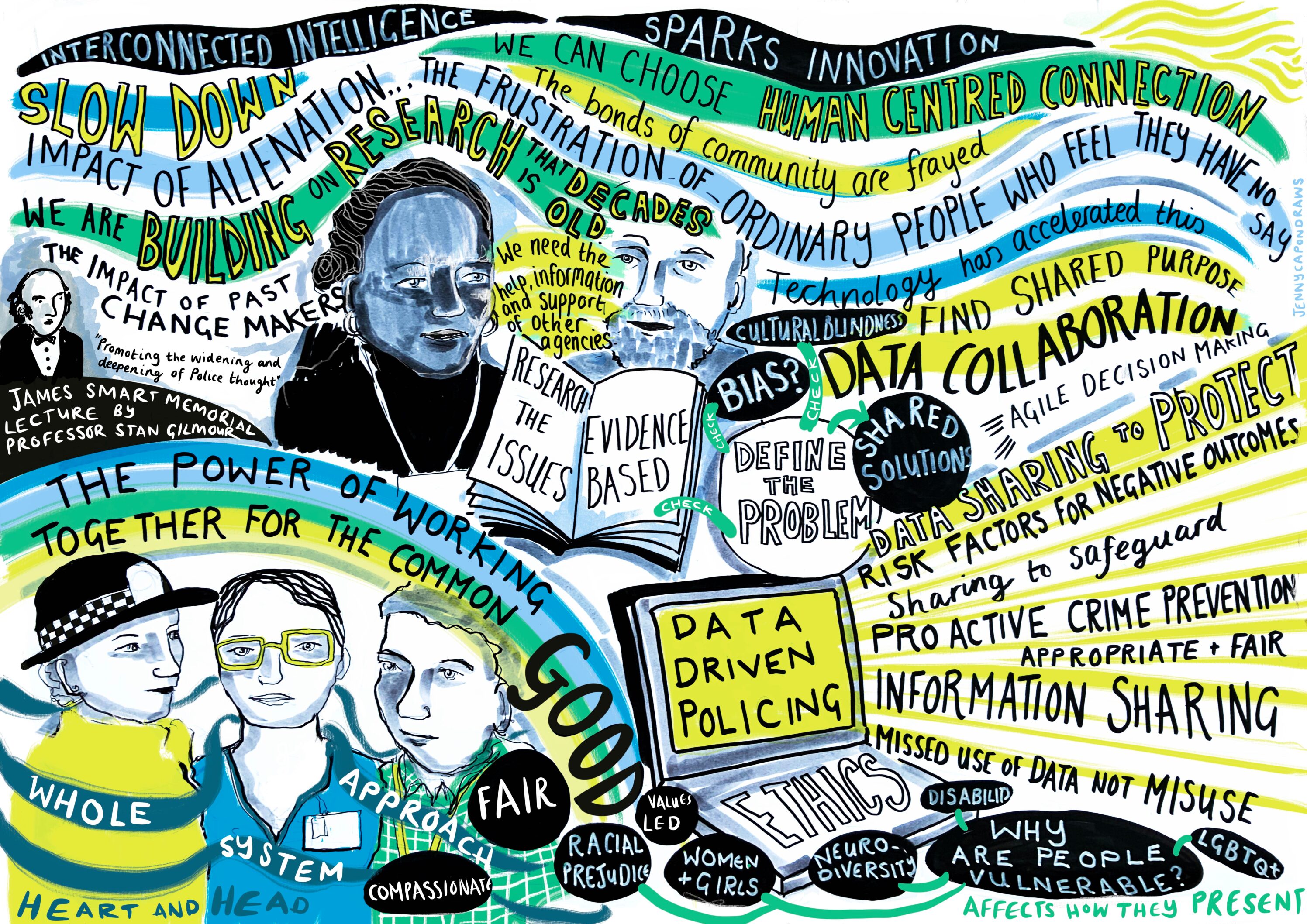
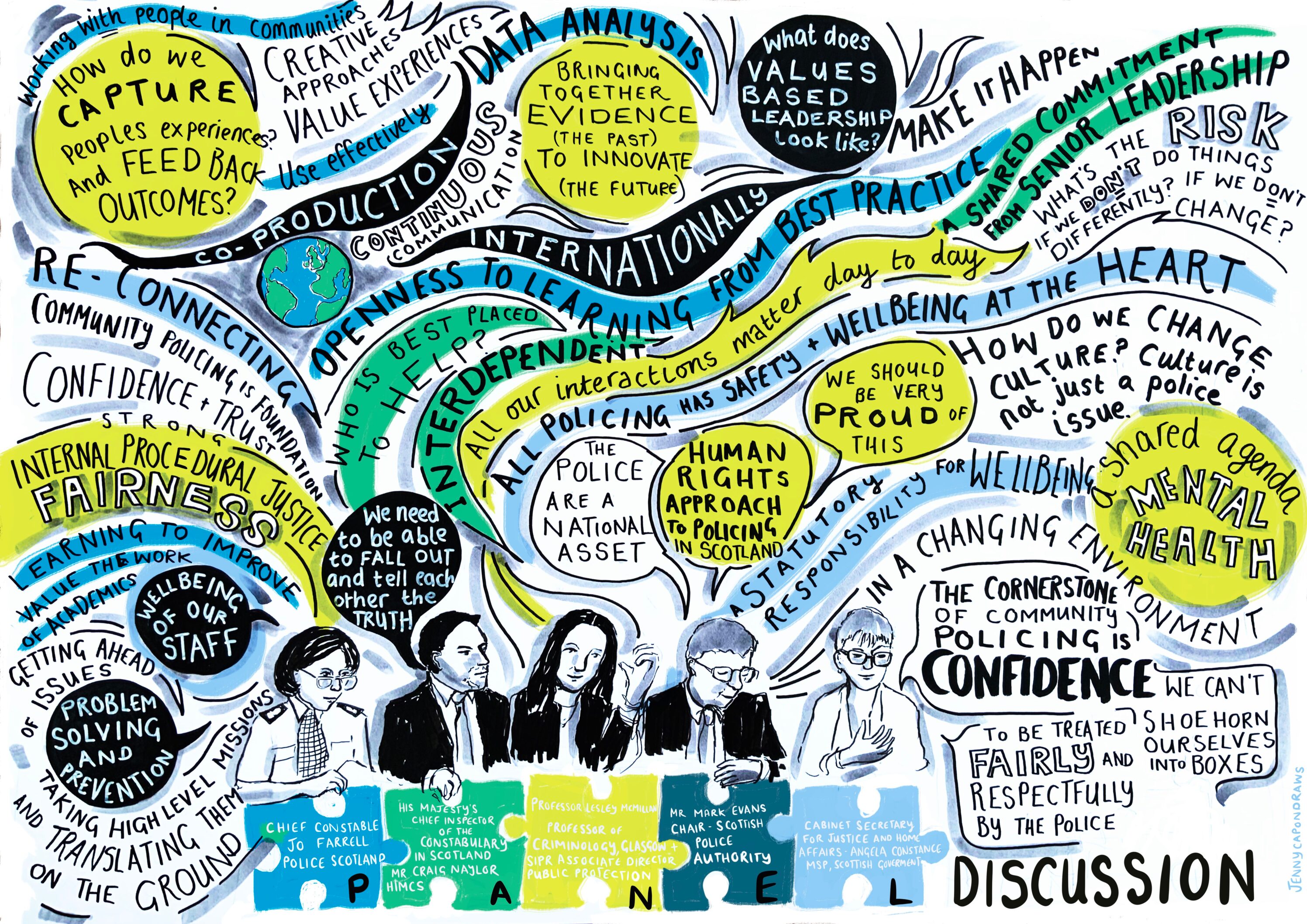
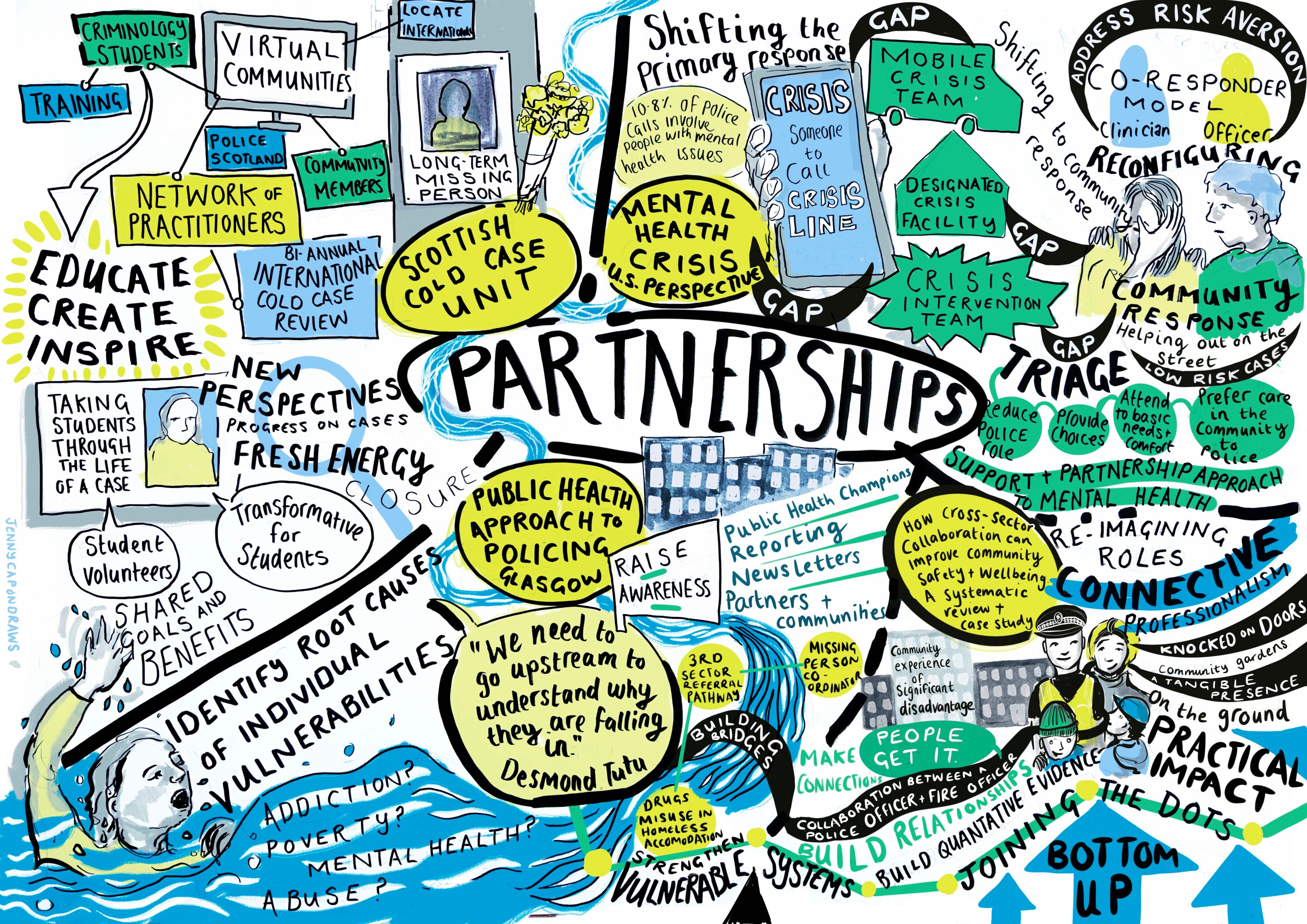
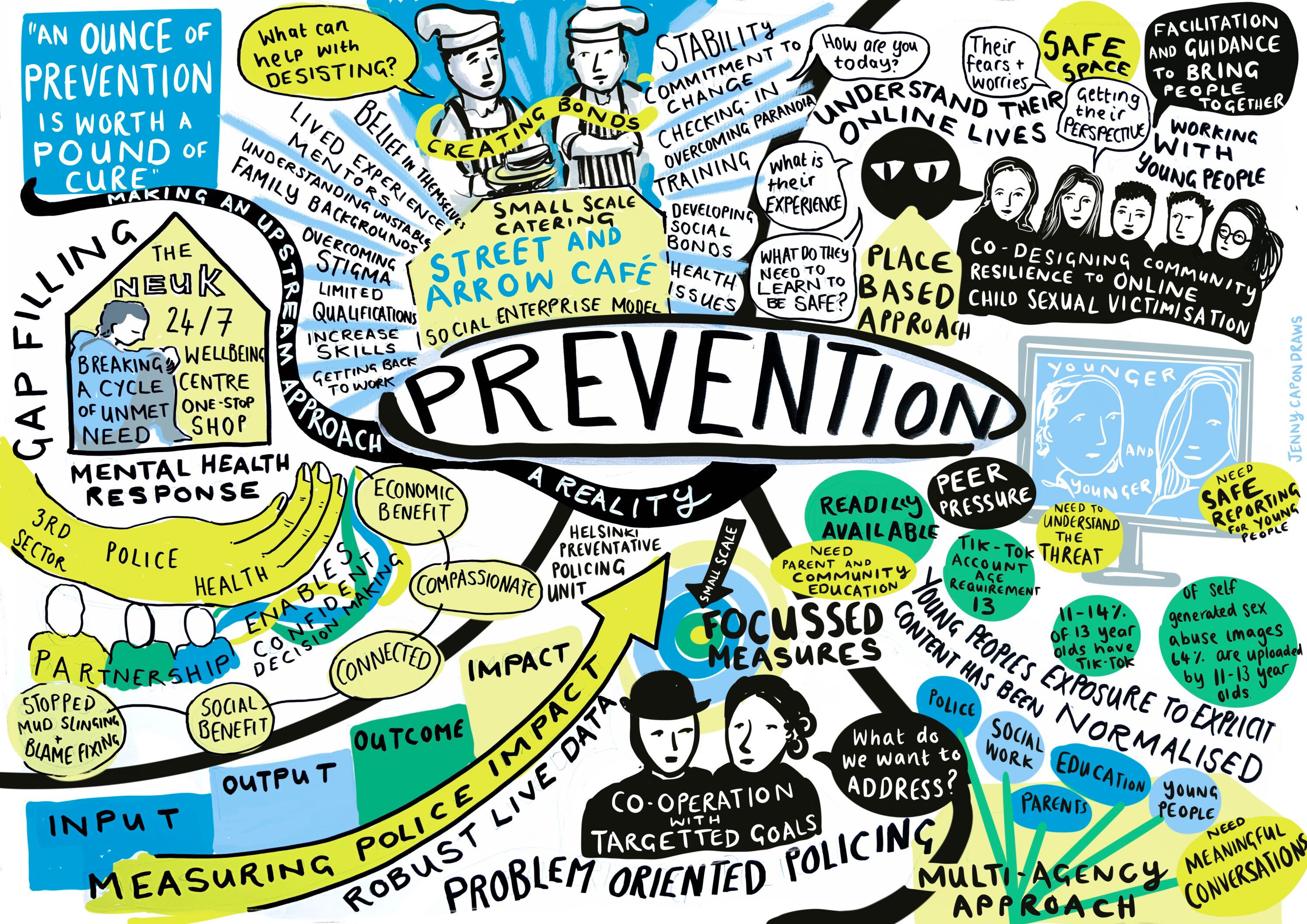
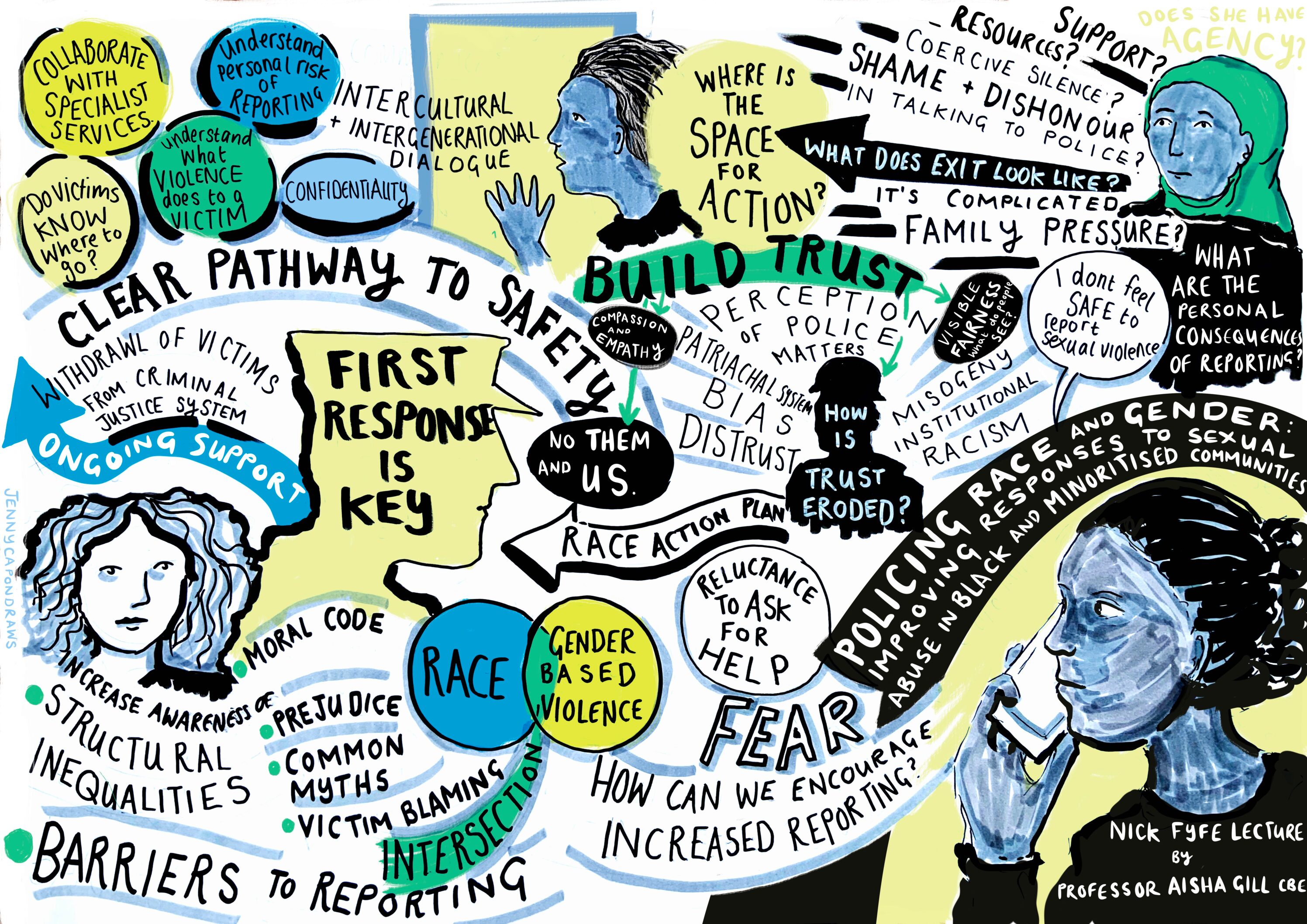
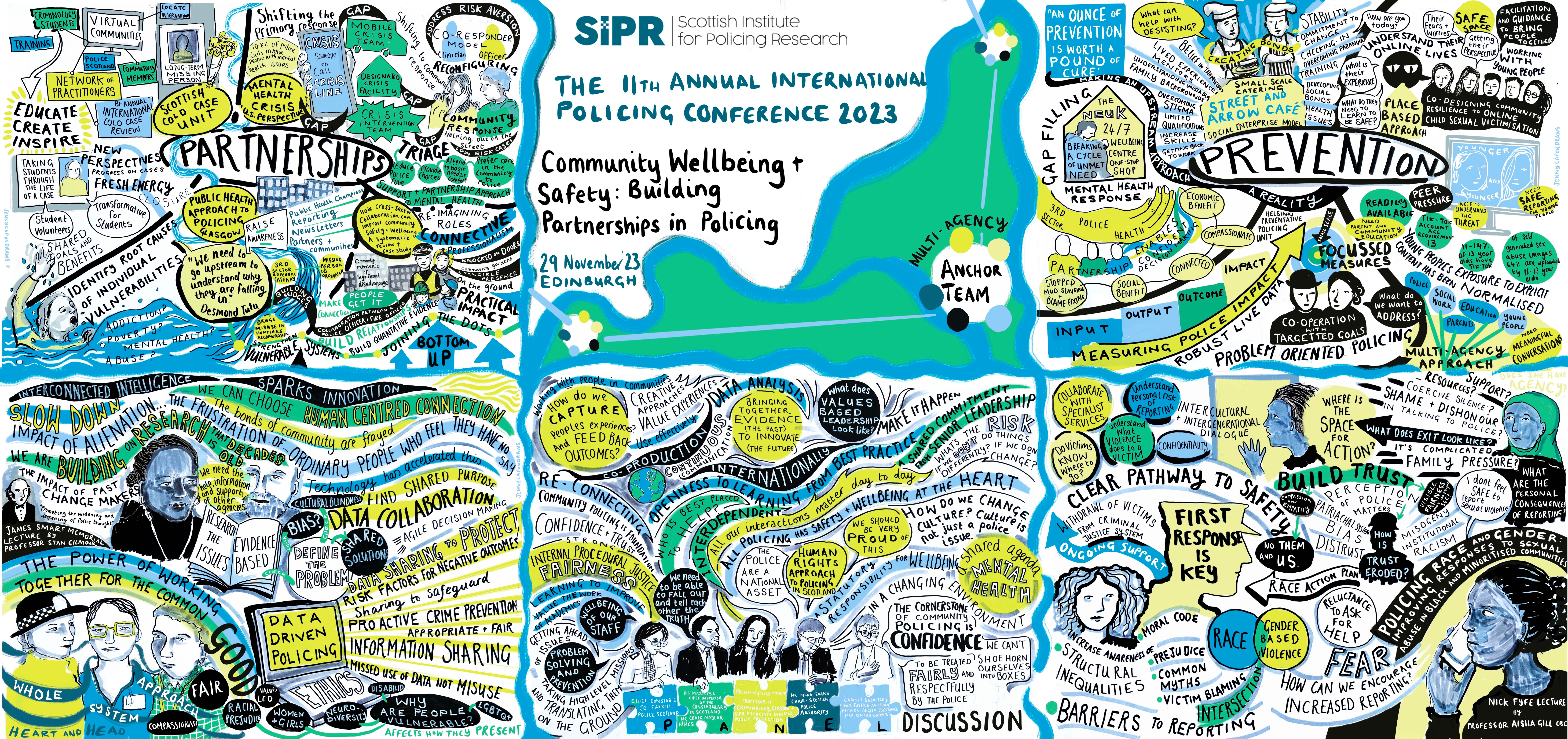
 I attended the 11th Scottish International Policing Conference in November 2023. This was my fourth time attending the SIPR annual conference and I am delighted that this was the first time I have been invited to present at the main conference.
I attended the 11th Scottish International Policing Conference in November 2023. This was my fourth time attending the SIPR annual conference and I am delighted that this was the first time I have been invited to present at the main conference.
First however, I want to reflect on the SIPR Postgraduate Symposium. The PhD students presenting did an absolutely incredible job presenting cutting-edge research into important subjects including policing minorities in Scotland, improving cybercrime reporting, missing persons risk assessment tools, police education, emotional labour in policing and image based sexual abuse. The presentation that really stood out was Sam Conway’s presentation on using Avatar technologies in Online Investigative Interviews with Adolescents. A great way to explore how to utilise modern technologies to support police investigations. Reflecting on my role within the ESRC Vulnerability and Policing Futures Research Centre, we have taken a lot of great ideas from the day for our own Postgraduate network, such as the supportive and critical friend role of the mixed panel of practitioners and academics, which created a space for useful discussions inevitably further advancing student’s research approaches and relationships with key stakeholders.
The main conference theme, Community Wellbeing and Safety: Building Partnerships in Policing, brought together a group of wonderfully dedicated and inspiring academics and practitioners who discussed the ways in which we can support those who are most vulnerable. Professor Aisha Gill’s annual Nick Fyfe Lecture was incredibly important and insightful. Her discussion about improving policing responses for sexual abuse amongst Black and minority communities and more importantly the discussion she led afterwards with all delegates, helped to set the tone for the conference: asking difficult questions, taking responsibility, and finding solutions. This is important not just for police forces but also for academics, partners and the community. The first workshop on minoritised groups provided a useful overview and critical insight into current policy and practice, which highlighted that there is still a long way to go to address equality and racial discrimination. It was clear that there is more research needed to better understand the lived experiences of both minoritised communities and frontline staff who navigate international, national and local policies and practices, as well as community members’ emotions and intergenerational trauma.
Lunch provided a useful time to catch up with old and new colleagues about their work in this area but also to build new relationships and harbour ideas to address some of the issues discussed during the morning session. I was delighted to present as part of the afternoon workshop on Prevention with colleagues from Police Scotland, Helsinki Police and Abertay and Glasgow Caledonia University. Colleagues in this panel really embodied the passion and commitment that is needed to engage in meaningful and impactful research in the community. This fit well with the work I presented on with my colleague Dr Christine A Weirich, illustrating our co-production effort in Blackpool to increase community resilience to online child sexual victimisation, showing for the first time the video we created with local children: https://www.youtube.com/watch?v=n6Ugzke_9GY . The following discussion confirmed the need for this kind of research and the importance of sharing it in partnership environments such as this conference.
Unfortunately, due to Scottish weather, I had to leave earlier than expected but I was lucky enough to listen to the newly appointed Police Scotland Chief Constable Jo Farrell talking about her plans and direction for Police Scotland. I was glad to hear about the value she places on staff development and partnership approaches to address community wellbeing and safety. With ongoing projects in Scotland, I look forward to continue to work with Police Scotland and SIPR to help the Chief Constable to achieve her aims.
This year’s conference was another great success in my opinion. Attending for the first time as an external academic from outside of Scotland, I appreciated the opportunity to discuss current and future work with old and new colleagues from within and outside of academia. We will take a lot of learning away from this conference for our own events within the Vulnerability and Policing Futures Research Centre. In particular, the attending delegates representing policing, allied professions and policy bodies, as well as the way in which solution focussed and honest discussions were facilitated throughout.
I would like to congratulate and thank, Oana Petcu, Sam Conway and Dr Simon-Lewis Menzies for the great work they have done in organising the PhD symposium; Professor Liz Aston and Professor Lesley McMillan for the invite and hosting another fantastic SIPR conference; and of course the beating heart of the operation, Monica Craig, Dr Simon-Lewis Menzies and Dr Olivia Coombes for facilitating and organising everything.
 Attending a SIPR Postgraduate Symposium for the second time was a profoundly enriching experience, offering valuable insights into the diverse and impactful research conducted by policing postgraduates and early career researchers. The event surpassed its role as a platform for showcasing research within the field, underscoring the potential contributions to policing in Scotland and beyond.
Attending a SIPR Postgraduate Symposium for the second time was a profoundly enriching experience, offering valuable insights into the diverse and impactful research conducted by policing postgraduates and early career researchers. The event surpassed its role as a platform for showcasing research within the field, underscoring the potential contributions to policing in Scotland and beyond.
The symposium featured a notable panel discussion with esteemed experts in policing and policing research, emphasizing the importance of innovative solutions to combat transnational threats, reduce violence, address inequality, and enhance public safety. Remarkable experts like Professor Stan Gilmour, Dr. Andrew Wooff, Lorraine Gillies, Dr. Catriona Stewart OBE, and Amanda Coulthard shared their experiences and commitment to addressing complex challenges within the criminal justice system.
A highlight was the presentation and poster sessions, providing a testament to the depth of policing research and offering a chance to showcase individual work. The diverse topics, covering community safety to digital forensics, highlighted the broad spectrum of challenges in contemporary policing. A distinguished panel of experts added credibility to the evaluation process.
The best presentation, evaluated by the panelists, awarded Julia Zauner the first position, and Nesha Dixon and I (Dr. Mahnoz Illias) were recognized as runners-up. The best poster, determined by participant votes, awarded the first position to Belinda Onyeashie.
Notable presentations included Abigail Cunningham’s exploration of Scottish Pakistanis’ narratives of policing, Andy Wilson’s comparative analysis of County Lines policing, Esme O’Donnell’s research on effect of pandemic policing on public and police relationships, and Robert Holland’s study on emotional labour among British Transport Police officers. These projects emphasized critical issues like inclusivity, community relations, and the impact of policy responses on minority communities.
Belinda Onyeashie’s research on trusted evidence trails, Dr. Juraj Sikra’s work on improving cybercrime reporting, Dr. Simon-Lewis Menies’s research on communication of scientific evidence in rape cases, and Julia Zauner’s research on image-based sexual abuse addressed contemporary issues in policing.
The symposium also featured thought-provoking projects such as Nesha Dixon’s exploration of risk assessment tools for missing person investigations, Dilhan Töredi’s study on individual differences in identification accuracy, and Sam Conway’s research on using avatar technologies in online investigative interviews with adolescents.
Ólafur Örn Bragason’s research helped us to know more about the establishment of Police Science as a University Discipline in Iceland, exploring the reasons for the 2016 police education reform.
My own presentation on understanding the impact of motherhood, reproductive age, and workplace social support on the wellbeing of female police officers and staff received valuable feedback, sparking discussions about the importance of considering life stages and social support at workplace in promoting the well-being of female officers.
In conclusion, the 7th SIPR Postgraduate Symposium was a dynamic and intellectually stimulating event fostering a sense of community among researchers. The diverse range of topics showcased the relevance and impact of policing research on contemporary challenges within the criminal justice system, setting the stage for forthcoming symposiums and ongoing collaboration in the field. Witnessing the substantial progress made by the SIPR community researchers since the last PGR Symposium was truly gratifying, bringing a sense of accomplishment and pride for both my fellow researchers and me.
 I very much welcomed the dedicated focus on community wellbeing at this year’s Conference and have many takeaways for reflection. Speaking for myself, it seems as though, for at least a decade, there has been widespread acknowledgement that community wellbeing forms a part of the policing mission in Scotland, due to the introduction of the policing principles as part of the Police and Fire Reform (Scotland) Act 2012, yet this is the first time I’ve seen a Conference organised explicitly to address the theme. The wellbeing angle has usually been a side-topic to other big ticket issues. What was clear to me from the various diverse inputs I heard on the day is that communities clearly benefit from the policing mission being broader than traditional law enforcement and maintenance of public order. This is especially the case for people from communities that are under-represented, marginalised or in some way more vulnerable, and it is the effectiveness (or otherwise) of this ‘broad-mission’ policing that appears to influence whether they have trust and confidence in the police, and where the balance between under- and over-policing needs to be struck carefully and consensually. Another thing that struck me is that there is already a significant amount of knowledge and understanding in the space of trust and confidence in policing, and what factors undermine it or improve it yes, somewhat ironically, inaction in the face of this bank of evidence will perpetuate the undermining of trust and confidence. It is therefore imperative that the knowledge and evidence, and the strategy and policy already in place is effected, leading to tangible, visible and well-communicated action and change. I really welcomed the Panel’s commitment to action, their preparedness for difficult strategic conversations on sensitive topics such as the ‘policing’ of mental health and vulnerability (and, moreover, the ‘police’ role in safeguarding), and the Panel’s acknowledgement that improvement does not need to wait. For example, there are areas around partnership working, and information and data sharing that can improve experiences for practitioners and outcomes for communities now.
I very much welcomed the dedicated focus on community wellbeing at this year’s Conference and have many takeaways for reflection. Speaking for myself, it seems as though, for at least a decade, there has been widespread acknowledgement that community wellbeing forms a part of the policing mission in Scotland, due to the introduction of the policing principles as part of the Police and Fire Reform (Scotland) Act 2012, yet this is the first time I’ve seen a Conference organised explicitly to address the theme. The wellbeing angle has usually been a side-topic to other big ticket issues. What was clear to me from the various diverse inputs I heard on the day is that communities clearly benefit from the policing mission being broader than traditional law enforcement and maintenance of public order. This is especially the case for people from communities that are under-represented, marginalised or in some way more vulnerable, and it is the effectiveness (or otherwise) of this ‘broad-mission’ policing that appears to influence whether they have trust and confidence in the police, and where the balance between under- and over-policing needs to be struck carefully and consensually. Another thing that struck me is that there is already a significant amount of knowledge and understanding in the space of trust and confidence in policing, and what factors undermine it or improve it yes, somewhat ironically, inaction in the face of this bank of evidence will perpetuate the undermining of trust and confidence. It is therefore imperative that the knowledge and evidence, and the strategy and policy already in place is effected, leading to tangible, visible and well-communicated action and change. I really welcomed the Panel’s commitment to action, their preparedness for difficult strategic conversations on sensitive topics such as the ‘policing’ of mental health and vulnerability (and, moreover, the ‘police’ role in safeguarding), and the Panel’s acknowledgement that improvement does not need to wait. For example, there are areas around partnership working, and information and data sharing that can improve experiences for practitioners and outcomes for communities now.
 In attending the Scottish International Policing Conference for the first time, my engagement with SIPR and participation in the Northern Research Seminars set high expectations for this event. I was a bit unsure of what meaning to put to the theme of Community Well-Being & Safety: Building Partnerships in Policing, the conference surpassed expectations. From the inaugural keynote, a palpable desire among attendees and presenters to contribute to enhancing police services became evident. The term “better” encompasses meeting the needs of diverse police interactions, particularly with vulnerable individuals, and enhancing policing effectiveness by reducing crime.
In attending the Scottish International Policing Conference for the first time, my engagement with SIPR and participation in the Northern Research Seminars set high expectations for this event. I was a bit unsure of what meaning to put to the theme of Community Well-Being & Safety: Building Partnerships in Policing, the conference surpassed expectations. From the inaugural keynote, a palpable desire among attendees and presenters to contribute to enhancing police services became evident. The term “better” encompasses meeting the needs of diverse police interactions, particularly with vulnerable individuals, and enhancing policing effectiveness by reducing crime.
Singling out a specific presentation proves challenging, as each made meaningful scientific contributions with practical implications. The conference facilitated a critical self-evaluation of Iceland’s collaborative and crime prevention efforts, emphasizing the importance of contextual comparison and contrast.
Central to the presentations was the theme of innovation. Each session focused on identifying problems, devising innovative solutions, and rigorously evaluating their impact. Noteworthy is the overarching recognition that the police, in isolation, cannot singularly reduce crime. Collaborative initiatives, particularly with health care, child protection, social services, and NGO´s, emerged as pivotal in meeting diverse needs and fostering more effective crime reduction through prevention strategies.
Reflective policing emerged as a second salient point, underscoring the continuous learning process. This entails a commitment to understanding the diverse groups served and a relentless pursuit of improving service delivery by comprehending the unique needs of individuals requiring police assistance. Actively listening to those in contact with the police and proactively engaging with those who do not report crimes became focal points for achieving a sense of justice.
Summarily, the presentations exhibited a positive framing with a shared objective of enhancing police services. The conference distinguishes itself by balancing a practical focus with academic rigor, deviating from conventional scientific conferences. The emphasis on collaborative, innovative, and reflective approaches underscore the commitment to advancing policing practices for the betterment of both service recipients and the broader community. Noteworthy initiatives unveiled during the conference contribute significantly to the ongoing discourse on advancing policing strategies. However, avenues for future exploration may involve a deeper analysis of specific collaborative models and the sustained impact of innovative approaches over time. Additionally, delving into the challenges and limitations faced in implementing reflective policing practices could provide valuable insights into optimizing this aspect of police service improvement.
 November marks the time of the year for the SIPR Scottish International Policing Annual conference. This is my first time attending the event, as a fellow researcher from the Edinburgh Napier University working on the 3PO project. With the theme of Community Wellbeing and Safety: Building partnerships in Policing, the programme promises an exciting series of keynote lectures and breakout sessions across broad themes relating to partnerships, interventions, minoritized groups and lived-experiences experts. Kickstarting the event was Professor Aisha Gill’s Lecture, which provided me with an insightful and eye-opening discussion on the intersectionality of race and gender in influencing the reporting of sexual abuse among BAME women. Professor Gill’s feminist lens to an analysis of police response opened up a host of questions relating to the need to work with minority communities, the importance of cross-cultural knowledge in policing, workforce diversity in the police service, the crucial knowledge of lived-experience experts, and the integration of police interventions with other forms of support services. This impactful lecture spoke to a broad audience of practitioners, police officers, policy-makers and academics in the room, setting the context for issues which were explored in greater depth in the breakout sessions.
November marks the time of the year for the SIPR Scottish International Policing Annual conference. This is my first time attending the event, as a fellow researcher from the Edinburgh Napier University working on the 3PO project. With the theme of Community Wellbeing and Safety: Building partnerships in Policing, the programme promises an exciting series of keynote lectures and breakout sessions across broad themes relating to partnerships, interventions, minoritized groups and lived-experiences experts. Kickstarting the event was Professor Aisha Gill’s Lecture, which provided me with an insightful and eye-opening discussion on the intersectionality of race and gender in influencing the reporting of sexual abuse among BAME women. Professor Gill’s feminist lens to an analysis of police response opened up a host of questions relating to the need to work with minority communities, the importance of cross-cultural knowledge in policing, workforce diversity in the police service, the crucial knowledge of lived-experience experts, and the integration of police interventions with other forms of support services. This impactful lecture spoke to a broad audience of practitioners, police officers, policy-makers and academics in the room, setting the context for issues which were explored in greater depth in the breakout sessions.
The breakout sessions offered an amazing range of topics, so much so that I found it difficult to choose one out the three themes to attend for each of the sessions. Ultimately, I settled on Partnerships in Breakout Session 1, and Victim/survivor voices and experience for Breakout Session 2. In both sessions, I was amazed by the well-selected range of speakers from police services, community support services and academia. In the Partnerships session, interesting case examples were presented to highlight the importance and effectiveness of partnerships across institutions, as well as with communities. I am particularly intrigued ty the cold-case unit presentation by Dr Maureen Taylor and Sgt Andrew Jack, discussing an interesting case of a partnership with academia which have brought about significant benefits not only to educators and students in GCU and Police Scotland, but also to the broader community, such as the loved ones of the missing individuals in the cold cases.
In the Victim/survivor voices and experiences theme, as a researcher who values lived-experiences, I was particularly intrigued by the growing importance placed on the knowledge of lived-experience experts in policing research. I was also delighted for the opportunity to learn from a lived-experience speaker, Lorraine McIntosh, who drew on her early life experiences with the police and welfare institutions to demonstrate the importance of engaging people with lived-experiences in the design and delivery of services. Jen Douglas’ model of mobilising the knowledge of lived-experience experts to inform organisational structures and systems was nothing short of inspiring, and presented me with various insights on the ethical and practical issues relating to such forms of engagement.
Summing it all up was a panel session chaired by Professor Liz Aston, with an amazing panel of experts presenting higher, governance level perspectives on the various issues discussed across the day. In all, I had an awe-inspiring and satisfying day at the SIPR conference, having taken away a tremendous amount of knowledge and insights from diverse stakeholders. The SIPR conference also presented me with an amazing opportunity for networking with individuals outside of academia. I will certainly recommend this highly rewarding event for practitioners, policy-makers, academics, educators and students in the broad fields of criminology and policing.
 I recently attended the SIPR Annual Conference at the John McIntyre Conference Centre, Edinburgh. Having recently retired from Police Scotland and joined the Scottish Community Safety Network, I was looking forward to meeting some former colleagues at the event but also learning about some exciting projects not only within Scotland, but across the pond.
I recently attended the SIPR Annual Conference at the John McIntyre Conference Centre, Edinburgh. Having recently retired from Police Scotland and joined the Scottish Community Safety Network, I was looking forward to meeting some former colleagues at the event but also learning about some exciting projects not only within Scotland, but across the pond.
I got the train through to Edinburgh in the morning then made my first and only mistake of the day. I decided to rely on a well-known online map (there are plenty available) and walk to the venue to add to my steps count for the day. The online map decided to take me on a walk around the well-known “Athur’s Seat” and through a small forest! Thinking I was walking in the wrong direction I persisted with the route and thankfully it was accurate however a lot further than the route I took to walk back to the station!
It was great to arrive at the venue and the first person I saw in the car park looking to park his car was a former line manager, and a person who I value greatly, who was also a Guest Speaker at the event. Seeing him as the first person made me realise this would be a good day.
Time for a bit of networking, seeing old colleagues, including a former member of my team and chance to grab a great coffee and a croissant (well I had walked 1.5 miles and through a forest, so compensation was needed!) have a quick chat with my CEO then off to the auditorium for the first speaker and the opening address.
After the opening remarks, the first speaker was Professor Aisha Gill who provided academic research into sexual abuse within some of the minority ethnic communities. This was fascinating research into significantly horrific circumstances. Some of the comments she discussed resonated with me including how some communities have distrust of the police and if any disclosures are made by victims, it is difficult for the police to gain the trust of the victim, when the victim has more trust from within their own community. It made myself reflect on some of the cases I experienced during my professional career and the traumatic approach removing a victim from the immediate family because of the risk they faced. Possibly victimising the victim twice.
I then attended the First Breakout session which was focused on partnerships. I was amazed to listen to some of the innovative work carried out across Scotland. A personal highlight was the joint work between Police Scotland and Glasgow Caledonian University creating the Cold Case Unit investigating long-term missing people. I had a couple of reflections on this input. Firstly, most police officers who retire always reflect on the one case they could not resolve. I am no different and there is an active long-term missing person who has never been and unlikely will be found. It is still with me that I could not provide closure for that family. Secondly, I considered what I would have done if this opportunity arose when I was studying for my degree. There was only one thought, I am sure this course is over-subscribed. The work they are delivering is more than commendable and I am sure provides some families with closure.
The next input I found fascinating was on vulnerability and crisis response policing in the USA. Without doubt the biggest challenge facing policing today is “managing” vulnerable people incidents. It was a topic I have an interest as I was frustrated because the police are not the best people to meet somebody in crisis because they have limited (and yes, I accept it has improved since I joined the police) training in supporting people in crisis however they are seen as the first to respond to a crisis in the community. We have all seen the statistics for the high percentage of calls from the public relate to these incidents, so it was comforting to listen to other nations challenges and understand that Police Scotland are not alone. It was an impactful review from Doctor Amy Watson who provided academic evidence for “triage cars” and that the Mental Health doctor / nurse is also seen as a “cop” and an interesting case study on the Star Project in Denver.
Lunch provided an opportunity to network and listen from other partners and the challenges they are facing within communities as well as review some excellent posters. Some more time to catch up with old friends and listen to the challenges they are currently facing with policing.
The afternoon sessions I attended the Victim / Survivor Voices Experiences. The highlight of the day for myself was Lorraine McIntosh from the Positive Outcome Project. I have always been a big supporter of peer mentoring and the work that Lorraine has delivered should be recognised nationally. Not only because of the people she has supported, but also how she managed to face her own trauma and problematic substance misuse. She was a fantastic speaker and clearly powerful in the message she delivered.
Doctor Charlotte Barlow provided an insight into the Disclosure Scheme for victims of domestic violence. What I didn’t realise prior to her presentation was the impact of receiving the information on the current partner and the guilt they then feel for future partners, when the relationship finishes, being unaware of the history of abuse within their background. Thinking about this with the comments from the presenter made you understand why this feeling is suffered by the victim.
After the closing panel headed by the Chief Constable and other Chief Executives, it was time to head back to the train station. This time I decided to walk in a direction towards the city centre via the road network. I left the Conference believing that this has been a highlight of the year for myself with some excellent contributions. Just one word of advice. Don’t walk to this venue via a forest!
 SIPC 2023 Community Well-Being & Safety: Building Partnerships in Policing was the first policing conference I attended, and I was overwhelmed by the number and quality of examples of partnerships and project co-creation showcased by academic and professional contributors. Two examples in particular resonated with me: Cold-case unit partnership between Glasgow Caledonian University and Police Scotland, and Co-designing community resilience to Online Child Sexual Victimisation at the ESRC Vulnerability and Policing Futures Centre.
SIPC 2023 Community Well-Being & Safety: Building Partnerships in Policing was the first policing conference I attended, and I was overwhelmed by the number and quality of examples of partnerships and project co-creation showcased by academic and professional contributors. Two examples in particular resonated with me: Cold-case unit partnership between Glasgow Caledonian University and Police Scotland, and Co-designing community resilience to Online Child Sexual Victimisation at the ESRC Vulnerability and Policing Futures Centre.
Cases become cold when all available clues have been examined and investigators have reached a dead end. Such cases are re-open when there are new leads, or when there are fresh sets of eyes to review available evidence. Dr Taylor, Sgt Jack, and Prof McMillan showed that criminology students at Glasgow Caledonian University may become such investigators in their free time, and their work can lead towards identifying new leads to follow up. In addition to casework, students are introduced to an international network of institutions involved in cold case investigations. Such partnership is beneficial for Police Scotland and offers invaluable hands-on experience with real cases for students. I am curious to learn about future careers of these students—I believe that such unique and intensive experiences might motivate students to pursue careers within the police forces.
Dr Engelmann and Dr Weirich from the ESRC Vulnerability and Policing Futures Centre introduced an example of how community-based partnership and co-creation with stakeholders (in this case, including children and young people) can lead to powerful outcomes. The researchers reported strikingly high statistics of under-age children sharing their pictures on social platforms and potentially exposing themselves to online abuse. Drs Engelmann and Weirich described their approach in creating prevention tools aimed at increasing safe online behaviours among children and young people. In collaboration with children, parents, and providers of care services for young people, they explored topics including barriers to reporting incidents. Barriers may include psychological factors such as embarrassment, but also situational and spatial factors, and the researchers have worked with partners to define and create such safe spaces for sharing. I believe that many attendants of the session eagerly expect the release of the prevention video the researchers co-created with stakeholders and shared at the conference.
SIPC 2023 showcased how academics and practitioners can work together towards developing impact and contributing to safety and community wellbeing, and I look forward to what SIPR will bring in 2024.

INTRODUCTION
This reflection summarises SIPR conference learnings from the Partnerships and Victims/Survivors Voices breakout sessions.
The Partnerships session included presentations on the Cold Case Unit, Glasgow Public Health Policing Approach, US Police/Mental Health Crisis Response Models, and a Systematic Review on Cross-Service Collaboration for Community Wellbeing.
The Victims/Survivors session covered Online Sex Trafficking Networks, Implications of Lived Experiences for Policing, Embedding Lived Experiences in Systems Leadership, and Victim-Survivor Experiences of Domestic Violence Disclosure.
BREAKOUT SESSION 1- PARTNERSHIPS
The first presenter presented the Scottish Cold Case Unit which is based at Glasgow Caledonian University. It consists of a team of criminology students, alumni, and staff. They partner with Police Scotland’s Missing Person Unit and Locate International to review unsolved cases involving missing and unidentified people in the UK, with a particular focus on Scotland. They offer a fresh perspective on such cases to ensure no one is forgotten and bring closure for families and loved ones of missing persons.
They work collaboratively with students from around the world, hold a bi-annual collaborative cold case review and investigation with over 100 students from around the world, and share investigative findings with the police, state attorneys, and public prosecutor. Students receive rigorous skills training, as evident in positive feedback on the enthusiastic, dynamic learning environment, which further fuels their passion for learning and investigation.
Police Scotland and Locate International also endorsed the indispensable value of the unit’s work and partnerships in progressing these cold cases.
The second presenter presented The Greater Glasgow Public Health Approach to Policing. Their approach identifies root causes of vulnerabilities early to connect people to appropriate agencies for underlying issues like drugs, mental health, and poverty. This enhances prevention by tackling poor health drivers. They establish partner needs and expectations by enabling targeted interventions to shape longer-term population-focused policies. They achieve this through community engagement and raising awareness, evidence-based reporting, and newsletters. Their work is important, as direct community engagement is vital for actualising this population-based vision of linking individuals to appropriate care before crises escalate.
The third presenter presented Models of US police-mental health crisis response. These partnerships aim to reduce arrests and improve safety by offering community care linkage. It aims to enhance mutual understanding and preferred outcomes over police-only responses. The presenter highlighted that there are times in which law enforcement accompaniment may be necessary. For example, when a special circumstance warrants inclusion to support true justice system diversion; otherwise, the partnership model above has proven efficient in crisis response scenarios. Concluding, people in crisis prioritise respect, kindness, choice, and family inclusion, not institutionalisation.
The fourth presentation in this session presented the findings from a systematic review and case study of an area experiencing significant disadvantage. This study examined how cross-service collaboration can enhance community safety and wellbeing while reducing inequalities. Over 4000 sources were reviewed, with only 3 relevant reports found, indicating a significant literature gap.
Case study methods included interviews with nine emergency service officers to uncover strategic outcome barriers and the extent to which partnerships impacted safety and wellbeing in a disadvantaged area.
This Strategic Delivery Partnership (SDP) initiative enabled Scottish emergency and community agencies to collaboratively support residents using a public health approach.
However, findings showed collaboration was directed top-down rather than through on-ground cooperation across services working in silos. Except for the Violence Reduction Unit manager, tactical leadership interaction was lacking.
Recommendations included maintaining cultural cohesion and shared vision between police and fire officers at all levels to align community-building principles. Retaining responsive frontline staff skilled at nurturing local relationships enables collaborative resident support.
This SDP approach mirrors other models facilitating trust and inequality reduction through sustained community contact.
Takeaways
Inter-agency partnerships can significantly impact communities when guided by a common purpose. However, cultural gaps between sectors persist which may hinder collaborations. Furthermore, as evident from all the presentations in this session, cross-disciplinary partnerships yield immense gains. However, it is important to recognise different priorities while sustaining shared objectives.
BREAKOUT SESSION 4- VICTIMS/SURVIVORS VOICES AND EXPERIENCES
This session discusses insights on amplifying marginalised perspectives and lived experiences in policing, drawn from victim/survivor voices and experiences.
The first presentation in this session focused on the need for law enforcement to investigate the online dimension of sex trafficking. The study aimed to develop an approach for identifying distinct networks and evaluating the complexity of their digital traces. One of the limitations of this study, as highlighted by the presenter, was the reliance on secondary accounts of exploitation due to the sensitivity of the discussion. This, among other limitations, produced a technical result with a partial understanding of the online pattern, which captures only a fragmented picture.
These limitations highlight the complexities of prosecuting shadowy, cyber-facilitated abuse.
The second presenter spoke about their lived experience of how childhood deprivation and neglect could have indelibly changed their life trajectory. The session was so compelling that the audience shed a tear or more.
The presenter took us through their lived experience, struggles, challenges, and the support they received. The takeaway from this presentation is that nobody should be considered a write-off. With support and compassion, dysfunctional patterns can be unlearned, and the individual transformed.
Also, incorporating voices of lived experience directly into policy decisions involving LE is vital for such communities to feel truly seen and served.
The third presentation is a victims advocacy project that supports women with experience of Violence against Women and Girls (VAWG) and other forms of complex trauma to use their experience to reform support services. They engage with stakeholders to support implementation and improvement planning to create tools and live experience resources. However, it was highlighted that, despite well-intended infrastructure, competing priorities and limited staff capacity hamper lived experience participation. Although supportive policies and structures could assist in better incorporating first-hand input.
The fourth presenter offers a robust research viewpoint. The methods included data collection through FOI requests, semi-structured interviews, focused groups, and online surveys. The study aims to highlight victim-survivor perspectives, protect them, reduce Domestic Abuse (DA) incidence through prevention, and reduce the cost associated with DA.
Part of the areas this study covers in relation to victim-survivor perspectives is the responsibility placed on the victims and the burden of guilt and emotional strain they feel when they have to withhold past abuse details when new partners seek them.
The presenter concludes that it is important to recognise the limits of DVDs policy and what it can achieve. While DVDs have limits, alternate disclosure routes do enable personal and interpersonal safety.
Conclusion
The session concludes that prioritising long-suppressed perspectives is useful for reforming broken systems and catalysing healing. Responsible change requires confronting where processes failed by carefully listening to those with lived experiences. Justice begins by bravely hearing the truth.